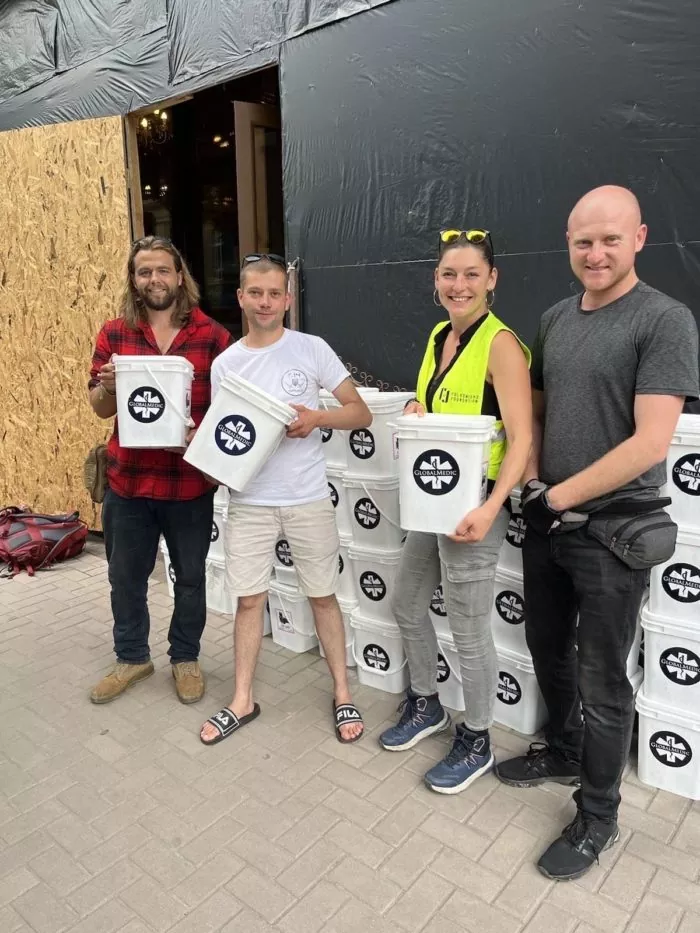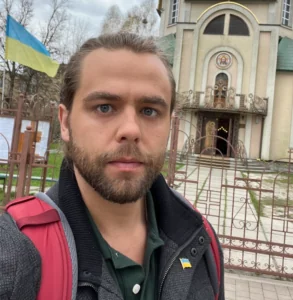In April of last year I crossed into Ukraine to serve as a humanitarian volunteer. After three months in that country, I reached the conclusion that the best way to help the Ukrainian people is enabling and expanding the localized humanitarian response through direct financial assistance. Small financial donations are far more likely to achieve maximum effectiveness in the hands of local Ukrainian organizations than large international NGOs encumbered by bureaucracy. Make no mistake, the need for help is dire.
The Ukrainians are in for a long winter. This is a brutal fact. Russia’s genocidal campaign against them is methodically targeting power grid infrastructure, in order to weaponize winter against the civilian population. Undaunted, the Ukrainian people are actively responding through grassroots volunteer groups, and have been doing so tirelessly since the first days of the war. These local groups do not lack commitment, skill, or organization; but they do need resources.

Back on this side of the Atlantic, there are many American and Canadian citizens who would like to help Ukraine, but aren’t sure where or how to start. While over there, I encountered and worked with many local humanitarian groups that were doing incredible things. I quickly realized though, that without actually having been in the country and meeting them in person, I would almost certainly not find these groups through a quick internet search.
So how can someone who wishes to help, ensure that their generosity will achieve maximum effectiveness?
Let’s define “maximum effectiveness” in this case as a donation which will
- go directly to the people and specific cause which you wish to support, and;
- will be put to use by the receiver to achieve the intended purpose as quickly as possible. (In the case of most small volunteer groups in Ukraine, the timeline from donation received to utilized is often, “tomorrow.”)
What exactly does the localized humanitarian response look like? The entire nation of Ukraine has mobilized to support the war effort. In every major city you will find small volunteer groups composed of civilians just trying to do what they can for their community, country and people. Many of these groups were founded just days after the war began, when friends determined to do something banded together.
In Kyiv, I met with a young couple who escaped from hell in Donbas. Their first action upon reaching their capitol? Helping others by joining the very volunteer group which originally rendered them assistance. They did this despite having recently lost everything.
Empowering local volunteer groups through direct financial donations helps in more than one way. The most obvious is that vital supplies will get where they need to go. Other impacts are intangible, yet tremendous. We visited several refugee shelters in Ukraine. Everywhere we went we were told that for the sake of mental health and the restoration of dignity, displaced persons simply needed something to do. Local volunteer groups provide the displaced population the potential to have a say in their own lives by giving them the opportunity to resist. The most astonishing thing about the impressive young couple which I met in Kyiv wasn’t their own resiliency and initiative, but that it wasn’t rare. Their spirit was representative of the Ukrainian nation as a whole.
The reality is that there are many Americans and Canadians who may want to help Ukraine, but aren’t sure where to begin. Without on-the-ground knowledge or connections to Ukraine through family or other ties, how should people in this category find groups to donate to?
There are two primary issues here. The first of course is trust. “How can I be sure the money I am sending is being used exactly how I am being told?” This is a fair question, as the lack of red tape and constraints on financial distribution is exactly what makes these groups so effective and swift compared to large international NGOs. And the second question, “how do I even find these groups in the first place?”
Both of these problems may be solved through a community-to-community approach. I recommend doing a little research and getting in touch with the Ukrainian diaspora in your community, state or province. It is highly likely that these diaspora groups are working with effective local teams on the ground in Ukraine. Invest time in this relationship, and you can identify specific projects which you would like to support. The bottom line is that they know what they need, and how to get it there. A Ukrainian Orthodox church or Ukrainian Greek Catholic Church in your community is likely a great way to start. This approach takes a little more time than simply hitting the “send” button on the donation page of more well known NGOs, but the potential payoff is substantial. In exchange for you time, you will form a deeper connection to the people being helped by your generosity.
There is nothing that the Ukrainian people want more than for their lives to return to normal, for their plans and dreams to be uninterrupted by war. Whether that day arrives sooner or later however, is largely up to the policy decisions of governments. Until that day comes, small Ukrainian volunteer groups staffed by ordinary people are proving daily that they do not lack the resolve, courage or compassion to do what must be done. They just need other ordinary people from across the pond to give them a little help. Maybe you won’t get a tax write off, but you might save a life.
Andrew Loftesnes served in the United States Marine Corps and as a humanitarian volunteer in Ukraine. He currently lives and works in Washington DC.
Related:
- This volunteer center is the reason Ukraine will win
- Ukraine’s secret to resisting Russia: resilience
- Lviv Garrison Church chaplains help soldiers find God amid war. And a pair of good boots
- Ukrainian theology professor turned sniper tells how to hunt for Russian invaders
- Whoever could, fled the Russians. We went back to Irpin to save the rest
- Created in three days, Ukraine’s territorial defense ruined Russian plans to capture Kyiv
- “They were shot in the back of the head.” Eyewitness account of Russia’s murders of Bucha residents

